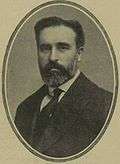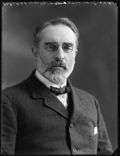J. M. Robertson
| John Mackinnon Robertson | |
|---|---|
 | |
| Born |
14 November 1856 Brodick |
| Died |
5 January 1933 London |
| Occupation | Journalist, politician, rationalist, writer |
John Mackinnon Robertson PC (14 November 1856[1] – 5 January 1933[2]) was a prolific journalist, advocate of rationalism and secularism, and Liberal Member of Parliament in the United Kingdom for Tyneside from 1906 to 1918. Robertson was best known as an advocate of the Christ myth theory.
Biography
Robertson was born in Brodick on the Isle of Arran; his father moved the family to Stirling while he was still young, and he attended school there until the age of 13. He worked first as a clerk and then as a journalist, eventually becoming assistant editor of the Edinburgh Evening News.[3]
He wrote in February 1906 to a friend that he "gave up the 'divine'" when he was a teenager.[4] His first contact with the freethought movement was a lecture by Charles Bradlaugh in Edinburgh in 1878. Robertson became active in the Edinburgh Secular Society,[5] soon after.[4] It was through the Edinburgh Secular Society that he met William Archer and became writer for the Edinburgh Evening News.[4] He eventually moved to London to become assistant editor of Bradlaugh's paper National Reformer, subsequently taking over as editor on Bradlaugh's death in 1891.[3] The National Reformer finally closed in 1893. Robertson was also an appointed lecturer for the freethinking South Place Ethical Society[6] from 1899 until the 1920s.
An advocate of the "New Liberalism,"[7] Robertson's political radicalism developed in the 1880s and 1890s, and he first stood for Parliament in 1895, failing to win Bradlaugh's old seat in Northampton as an independent radical liberal. Robertson was a staunch free trader and his Trade and Tariffs (1908) "became a bible for free-traders pursuing the case for cheap food and the expansion of trade".[8]
In 1915 he was appointed to the Privy Council.
At the United Kingdom general election, 1918, as a Liberal candidate he contested Wallsend, a constituency based largely on his Tyneside seat, but finished third. He contested the United Kingdom general election, 1923 as Liberal candidate for Hendon without success.
Robertson died in London in 1933.[3]
Homer Smith has described Robertson as an "outstanding exponent of rationalism and one of the foremost scholars produced in England in the last six decades."[9]
Electoral record
| Party | Candidate | Votes | % | ± | |
|---|---|---|---|---|---|
| Liberal | Henry Du Pré Labouchère | 4,884 | 27.0 | -4.1 | |
| Conservative | Charles Gustavus Adolphus Drucker | 3,820 | 21.0 | +2.5 | |
| Lib-Lab | Edward Harford | 3,703 | 20.4 | -9.1 | |
| Conservative | Jacpb Jacobs | 3,394 | 18.7 | -2.2 | |
| Social Democratic Federation | Frederick George Jones | 1,216 | 6.7 | n/a | |
| Independent Liberal | John Mackinnon Robertson | 1,131 | 6.2 | n/a | |
| Majority | 117 | 0.6 | |||
| Turnout | 83.5 | +2.3 | |||
| Liberal hold | Swing | ||||
| Conservative gain from Liberal | Swing | ||||

| Party | Candidate | Votes | % | ± | |
|---|---|---|---|---|---|
| Liberal | John Mackinnon Robertson | 11,496 | 62.5 | +11.2 | |
| Conservative | James Knott | 6,885 | 37.5 | -11.2 | |
| Majority | 4,611 | 25.0 | +22.4 | ||
| Turnout | 79.3 | +4.4 | |||
| Liberal gain from Liberal Unionist | Swing | +11.2 | |||
| Party | Candidate | Votes | % | ± | |
|---|---|---|---|---|---|
| Liberal | John Mackinnon Robertson | 13,158 | 62.8 | +0.3 | |
| Conservative | Alfred Henry John Cochrane | 7,807 | 37.2 | -0.3 | |
| Majority | 5,351 | 25.6 | +0.6 | ||
| Turnout | 81.5 | +2.2 | |||
| Liberal hold | Swing | +0.3 | |||
| Party | Candidate | Votes | % | ± | |
|---|---|---|---|---|---|
| Liberal | John Mackinnon Robertson | 11,693 | 63.0 | +0.2 | |
| Conservative | Helenus Macaulay Robertson | 6,857 | 37.0 | -0.2 | |
| Majority | 4,836 | 26.0 | +0.4 | ||
| Turnout | 72.1 | -9.4 | |||
| Liberal hold | Swing | +0.2 | |||

| Party | Candidate | Votes | % | ± | |
|---|---|---|---|---|---|
| National Democratic | Matthew Turnbull Simm | 10,246 | n/a | ||
| Labour | John Chapman | 6,835 | n/a | ||
| Liberal | Rt Hon. John Mackinnon Robertson | 3,047 | n/a | ||
| Majority | 3,411 | n/a | |||
| Turnout | n/a | ||||
| National Democratic win | |||||
| Party | Candidate | Votes | % | ± | |
|---|---|---|---|---|---|
| Unionist | Rt Hon. Philip Lloyd-Graeme | 13,278 | 51.9 | -10.9 | |
| Liberal | Rt Hon. John Mackinnon Robertson | 7,324 | 28.6 | +8.2 | |
| Labour | Charles Latham | 5,005 | 19.5 | +2.7 | |
| Majority | 5,954 | 23.3 | -3.5 | ||
| Turnout | 67.3 | ||||
| Unionist hold | Swing | -9.6 | |||
Views
Economically, Robertson has been described as an underconsumptionist, and he gave an early form, perhaps the earliest formal statement, of the paradox of thrift in his 1892 book The Fallacy of Saving.[14][15]
Robertson was an advocate of the Christ myth theory, and in several books he argued against the historicity of Jesus. According to Robertson, the character of Jesus in the New Testament developed from a Jewish cult of Joshua, whom he identifies as a solar deity.
- 1900 Christianity and Mythology ;
Long before Biblical Judaism was known, the people of Palestine shared in the universal rituals of the primeval cults of sun and moon, Nature and symbol; and the successive waves of conquest, physical and mystical, have only transformed the primordial hallucination.[16]
- 1902 A Short History of Christianity ;
The older portions of the Pauline epistles show no knowledge of any Jesuine biography or any Jesuine teaching —a circumstance which suggests that the Jesus of Paul is much more remote from Paul's day than is admitted by the records.[17]
Oxford theologian and orientalist Frederick Cornwallis Conybeare wrote a book titled, The Historical Christ; or, An investigation of the views of Mr. J. M. Robertson, Dr. A. Drews, and Prof. W. B. Smith (1913), directed against the Christ myth theory defended by the three authors.
Selected works
- Modern Humanists (1891)
- Miscellanies (1898)
- History of Freethought in the Nineteenth Century, (1899)
- Christianity and Mythology. Watts. 1900. (1900)
- Studies in Religious Fallacy (1900)
- A Short History of Christianity. Watts & Co. 1902. (1902)
- Pagan Christs - Studies in Comparative Hierology. Watts & Co. 1911 [1903].
- Letters on Reasoning. Watts. 1902. (1905, 2nd edition)
- A Short History of Freethought: Ancient and Modern Volume 1, Volume 2 (1906)
- Rationalism (1912)
- The Baconian Heresy: A Confutation (1913)
- The Historical Jesus: A Survey of Positions (1916)
- The Jesus Problem: Restatement of the Myth Theory (1917)
- Shakespeare and Chapman (1917)
- Short History of Morals (1920)
- The Shakespeare Canon (1922-1932)
- Jesus and Judas (1927)
References
- ↑ Page, Martin. (1984) Britain's Unknown Genius An Introduction to the Life-Work of John Mackinnon Robertson. London: South Place Ethical Society, p. 13. ISBN 0902368109
- ↑ Wells, G. A., ed. (1987) J. M. Robertson (1856–1933) Liberal, Rationalist, and Scholar: An Assessment by Several Hands; edited by G. A. Wells. London; Pemberton, p. 26. ISBN 0301870012
- 1 2 3 "The Rt. Hon. J. M. Robertson". Retrieved 13 February 2010.
- 1 2 3 Wells, G.A. Ed. (1987) J.M. Robertson (1856–1933) Liberal, Rationalist, and Scholar: An Assessment by Several Hands Edited by G.A. Wells. London; Pemberton, p. 13. ISBN 0301870012
- ↑ "Edinburgh Secular Society". About us. Retrieved 2 October 2013.
- ↑ "Progress Through Two Centuries: A Short History of the South Place Ethical Society". Archived from the original on 18 January 2000. Retrieved 13 February 2010.
- ↑ Tanner, Duncan (13 February 2003). "Political Change and the Labour Party 1900-1918". Cambridge University Press. Retrieved 11 March 2017 – via Google Books.
- ↑ Michael Freeden, 'Robertson, John Mackinnon (1856–1933)', Oxford Dictionary of National Biography, Oxford University Press, Sept 2004; online edn, May 2006, accessed 5 April 2009.
- ↑ Smith, Homer W. (1952). Man and His Gods. Little, Brown and Company. p. 477
- 1 2 3 4 British Parliamentary Election Results 1885-1918, FWS Craig
- ↑ Debrett's House of Commons & Judicial Bench, 1901
- 1 2 Debrett's House of Commons & Judicial Bench, 1916
- 1 2 British Parliamentary Election Results 1918-1949, FWS Craig
- ↑ Robertson, John M. (1892). The Fallacy of Saving.
- ↑ Nash, Robert T.; Gramm, William P. (1969). "A Neglected Early Statement the Paradox of Thrift". History of Political Economy. 1 (2): 395–400. doi:10.1215/00182702-1-2-395.
- ↑ Robertson, John Mackinnon (1900). Christianity and Mythology. Watts & Company. p. 422.
Long before Biblical Judaism was known, the people of Palestine shared in the universal rituals of the primeval cults of sun and moon, Nature and symbol; and the successive waves of conquest, physical and mystical, have only transformed the primordial hallucination. (Image of p. 422 at Google Books)
- ↑ Robertson, John Mackinnon (1902). A Short History of Christianity. Watts & Company. p. 13.
The older portions of the Pauline epistles show no knowledge of any Jesuine biography or any Jesuine teaching —a circumstance which suggests that the Jesus of Paul is much more remote from Paul's day than is admitted by the records. (Image of p. 13 at Google Books)
Further reading
- Anonymous (1901). "Reviewed Work: Christianity and Mythology by John M. Robertson". The Monist. 12 (1): 145–146. JSTOR 27899295.
- Bowen, Clayton R. (1919). "Reviewed Works: The Historical Jesus by John M. Robertson; The Jesus Problem by John M. Robertson". The American Journal of Theology. 23 (3): 378–381. JSTOR 3155305.
- Moncrief, J. W. (1903). "Reviewed Work: A Short History of Christianity by John M. Robertson". The American Journal of Theology. 7 (1): 201. JSTOR 3154389.
- Case, Shirley Jackson (1920). "Reviewed Work: The Jesus Problem. A Restatement of the Myth Theory by J. M. Robertson". Harvard Theological Review. 13 (3): 295–296. JSTOR 1507751.
- Dekkers, Odin (1999). J. M. Robertson: Rationalist and Literary Critic. Ashgate.
- Mackenzie, John Stuart (1892). "Modern Humanists by John M. Robertson". International Journal of Ethics. 2 (2): 263–264. JSTOR 2375748.
- Watt, Paul (2017). Ernest Newman: A Critical Biography. The Boydell Press.
- Wells, George Albert (1987). J. M. Robertson (1856-1933): Liberal, Rationalist, and Scholar: An Assessment. Pemberton.
External links

- Works by J. M. Robertson at Project Gutenberg
- Works by or about J. M. Robertson at Internet Archive
| Parliament of the United Kingdom | ||
|---|---|---|
| Preceded by Hugh Crawford Smith |
Member of Parliament for Tyneside 1906–1918 |
Constituency abolished |
| Political offices | ||
| Preceded by Harold Tennant |
Parliamentary Secretary to the Board of Trade 1911–1915 |
Succeeded by E. G. Pretyman |
| Party political offices | ||
| Preceded by George Lunn |
President of the National Liberal Federation 1920–1923 |
Succeeded by Donald Maclean |